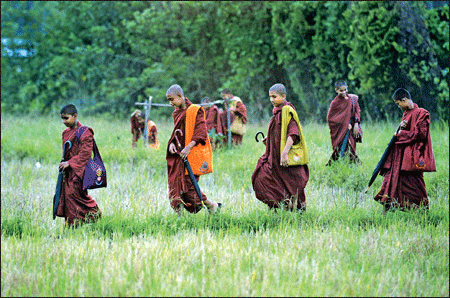
Bilingual education, which has been implemented in the Government school system in Sri Lanka since 2001 has not been totally a new practice in the country.
Bilingual education was prominent in pre colonial era, colonial era and post colonial era, too. When Buddhism based religious education was introduced in the 3 BC, there was the need for bilingual education.
It had been tackled in such a way addressing and reflecting principles of bilingual education and its related theoretical principles in terms of psycholinguistics, sociolinguistics, applied linguistics and linguistically important content such as phonology, morphology, syntax, semantics and pragmatics though such modern terms had not been used in describing its instructional design.
These facts are evident when scrutinizing documents on religious education and religion based education in the ancient Sri Lanka with the sole purpose of facilitating laymen to direct them towards “the right way of living”.
Currently the need for developing plurilingual and multilingual capacities of Buddhist priests, at a minimum in two languages (in one locally powerful language and the other one in an internationally powerful language) is essential to proliferate Buddhism.
Today the world population wants to be aware of Buddhism, its philosophy, cognition-awakening practices through meditation by linking and contrasting Buddhist practices with novel practices and discoveries of science.
This current global appeal can be addressed through promoting communication using at least one international language.
Thus Sri Lankan Buddhist priests’ capacity in explaining, clarifying, describing and critically commenting on Buddhism can be supported through promoting their plurilingual capacities across bilingual education.
This cannot be done by teaching English as a subject alone because of the acquisition-poor-environment for using English in day-to-day life. Development of both general and academic English together by priests through bilingual education would arm them to face future challenges in communication in multilingual settings.
Hence bilingual education would be a multifaceted, versatile approach to fulfil communication needs through development of plurilingual talents of Buddhist priests.
Source : http://www.dailynews.lk




